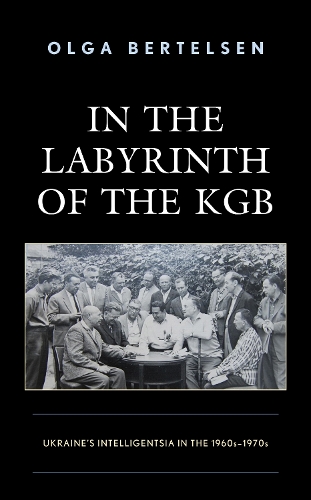
In the Labyrinth of the KGB: Ukraine's Intelligentsia in the 1960s1970s
(Hardback)
Publishing Details
In the Labyrinth of the KGB: Ukraine's Intelligentsia in the 1960s1970s
By (Author) Olga Bertelsen
Bloomsbury Publishing PLC
Lexington Books
15th February 2022
United States
Classifications
Professional and Scholarly
Non Fiction
Social groups: religious groups and communities
947.7085
Winner of Kjetil Hatlebrekke Memorial Book Prize 2024
Physical Properties
Hardback
370
Width 160mm, Height 228mm, Spine 30mm
776g
Description
This book focuses on the generation of the sixties and seventies in Kharkiv, Soviet Ukraine, a milieu of writers who lived through the Thaw and the processes of de-Stalinization and re-Stalinization. Special attention is paid to KGB operations against what came to be known as the dissident milieu, and the interaction of Ukrainians, Jews, and Russians in the movement, their persona friendships, formal and informal interactions, and the ways they dealt with repression and arrests. This study demonstrates that the KGB unintentionally facilitated the transnational and intercultural links among the Kharkiv multi-ethnic community of writers and their mutual enrichment. Post-Khrushchev Kharkiv is analyzed as a political space and a place of state violence aimed at combating Ukrainian nationalism and Zionism, two major targets in the 1960s1970s. Despite their various cultural and social backgrounds, the Kharkiv literati might be identified as a distinct bohemian group possessing shared aesthetic and political values that emerged as the result of de-Stalinization under Khrushchev. Archival documents, diaries, and memoirs suggest that the 1960s1970s was a period of intense KGB operations, active measures designed to disrupt a community of intellectuals and to fragment friendships, bonds, and support among Ukrainians, Russians, and Jews along ethnic lines domestically and abroad.
Reviews
A meticulous analysis of archival sources and personal interviews, Labyrinth is the first study of the generation of Kharkiv dissidents during the 1960s and 1970s. Blending biography and history, Bertelsen offers a rich vein of unexplored information, telling the story with flair, an insiders knowledge of personalities, and a keen understanding of how the KGB worked. The book is a must read for students of Soviet political and cultural history and for readers who wish to understand the current situation in Russian-Ukrainian relations.
-- Myroslav Shkandrij, University of ManitobaIn this beautifully written and superbly researched work of history, Bertelsen brings to life the transcultural and transethnic world of the Kharkiv intelligentsia in the 1960s and the 1970s. Authoritative, erudite, and poignant, this is also an illuminating study of KGB repression and the life and fate of writers in those difficult times.
-- Lynne Viola, University of TorontoA path-breaking book, it sheds new light on Kharkiv writers tortuous paths negotiated in their daily confrontations with the KGB. Bertelsen identifies the mechanisms that served to maintain system stability that ultimately led to system instability in the USSR. This extensive ethnographic and archival research creates an unforgettable, fine-grained portrait of Ukrainian, Russian, and Jewish intellectuals struggling against state violence.
-- Alexander J. Motyl, Rutgers University-Newarka highly nuanced and psychologically insightful history of the Ukrainian, Russian, and Jewish writers in Kharkiv, and their resistance to Soviet efforts to reintroduce the repressive measures of the Stalinist past. A major contribution to our understanding of the thaw generation. . .
-- George O. Liber, University of Alabama-BirminghamThis book is central to understanding the reasons for the fall of the Soviet ideology and party control over the Soviet intelligentsia, many of whom managed to cross the ethnic and ideological boundaries imposed by the regime to divide them. In doing, so they destroyed not only those boundaries, but also the foundations of the regime itself.
-- Serhii Plokhy, Harvard UniversityAn engagingly written Labyrinth is the cultural history of post-Stalin Kharkiv, and the city's intelligentsia coped with the tortuous provocations and repressions of the KGB. Nationality relations among themabove all between Jews and Ukrainiansalso occupy a prominent place in Bertelsens diligently researched narrative.
-- Norman M. Naimark, Stanford UniversityAuthor Bio
Olga Bertelsen is associate professor of global security and intelligence at Tiffin University.
